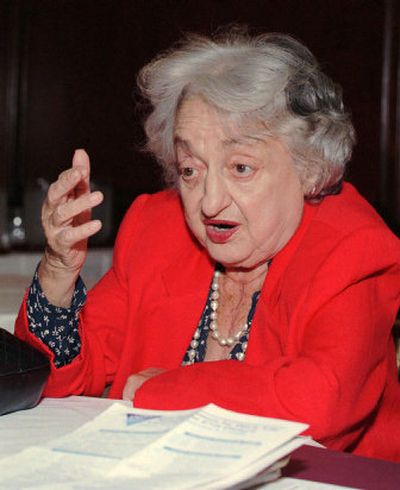Feminist icon Friedan dies at 85

WASHINGTON – Betty Friedan, whose manifesto “The Feminine Mystique” became a best seller in the 1960s and laid the groundwork for the modern feminist movement, died Saturday, her birthday. She was 85.
Friedan died at her home of congestive heart failure, according to a cousin, Emily Bazelon.
Friedan’s assertion in her 1963 best seller that having a husband and babies was not everything and that women should aspire to separate identities as individuals was highly unusual, if not revolutionary, just after the baby and suburban booms of the Eisenhower era.
The feminine mystique, she said, was a phony bill of goods society sold to women that left them unfulfilled, suffering from “the problem that has no name,” and seeking a solution in tranquilizers and psychoanalysis.
“A woman has got to be able to say, and not feel guilty, ‘Who am I, and what do I want out of life?’ She mustn’t feel selfish and neurotic if she wants goals of her own, outside of husband and children,” Friedan said.
Eleanor Smeal, president of the Feminist Majority Foundation, publisher of Ms. magazine and a former president of the National Organization for Women, praised Friedan’s legacy.
Friedan, she said, “was a giant for women’s rights and a leading catalyst of the 20th century whose work led to profound changes improving the status of women and women’s lives” worldwide.
In the racial, political and sexual conflicts of the 1960s and ‘70s, Friedan’s was one of the most commanding voices and recognizable presences in the women’s movement.
As the first president of NOW in 1966, she staked out positions that seemed extreme at the time on such issues as abortion, sex-neutral help-wanted ads, equal pay, promotion opportunities and maternity leave.
But at the same time, Friedan insisted that the women’s movement had to remain in the American mainstream, that men had to be accepted as allies and that the family should not be rejected.
Friedan, born Feb. 4, 1921, in Peoria, Ill., was a high-achieving Jewish outsider growing up in Middle America. Her father, Harry Goldstein, owned a jewelry store; her mother, Miriam, quit a job as a newspaper women’s page editor to become a housewife.
From high school valedictorian in 1938 to summa cum laude graduate of Smith College in 1942, “I was that girl with all A’s and I wanted boys worse than anything,” she said.
She won a fellowship in psychology to the University of California at Berkeley, but turned down a bigger fellowship there so as not to outdo a boyfriend.
The romance broke up anyway and Friedan moved to Greenwich Village in New York and became a labor reporter.
She lost one job to a returning World War II veteran but found another before marrying Carl Friedan, a summer-stock producer and later an advertising executive, in 1947. The marriage, which produced three children, ended in divorce 22 years later.
Friedan got a maternity leave to have her first child in 1949 but was fired and replaced by a man when she asked for another leave to have a second child five years later.
The family had moved to a big Victorian house in the suburban Rockland County village of Grandview-on-the-Hudson, N.Y., where Friedan cranked out freelance magazine articles while bringing up her brood.
Hoping to get a magazine piece out of a Smith College 15-year reunion, Friedan prepared an in-depth survey of her classmates. What she found was that these well-educated women of the class of 1942, now largely suburban housewives, were asking, in effect, “Is this all?”
Friedan couldn’t get the article published in a magazine, but five more years of research and writing turned it into “The Feminine Mystique.”